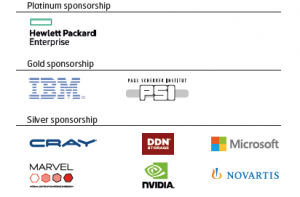The PASC18 Organizing Team would like to remind you that the deadline for registration is just 7 days from now. We are also pleased to bring to your attention the variety of topics that will be discussed this year within the minisymposia program, and we would like to thank all our sponsors, without whom our conference would not be possible.
Registration
We are pleased to see on our list of participants the familiar names of many PASC Conference regulars, as well as many more who will be attending the conference for the first time.
We invite all those who have not done so already, to register for the event by June 15, 2018.
We look forward to welcoming you to the charming city of Basel for three days of stimulating technical sessions and networking opportunities. The full program of the conference is available here.
Minisymposia Program
This year’s program includes close to 50 topically-focused minisymposia, of which most, if not all, are highly multidisciplinary in their scope. Don’t miss the opportunity to gain insight from researchers working in other scientific domains – perhaps they are using algorithms, tools, or techniques that could be applied within your own domain? The titles of this year’s minisymposia are as follows:
MS01 – Adaptive Parallel Strategies for the Exploration of Challenging Search Spaces with Applications in Particle Simulations and Optimization, Part I (A. Vitalis)
MS02 – Capability Computing, Performance Portability, and Co-Design in the PASC Projects (J. VandeVondele)
MS03 – Computational Aspects of Heterogeneous Agents Macro (F. Kubler)
MS04 – Distributed Training of Deep Neural Net Models for High Energy Physics (J.-R. Vlimant)
MS05 – Foundations and Applications of Performance Engineering (G. Wellein)
MS06 – Large Scale Electronic-Structure Calculations on Modern and Future High-Performance Supercomputers (S. Goedecker)
MS07 – Machine Learning in Weather and Climate (P. Dueben)
MS08 – On the Road to Exascale Computing: Turbulence Simulations of Complex Flows at the Petaflops Pit Stop, Part I: Applications (R. Balakrishnan)
MS09 – Adaptive Parallel Strategies for the Exploration of Challenging Search Spaces with Applications in Particle Simulations and Optimization, Part II (A. Vitalis)
MS10 – Bridging the Software Productivity Gap for Climate and Weather Models (X. Lapillonne)
MS11 – Computing the Effect of Risk (M. Juillard)
MS12 – Engineering Scientific Software in times of Agile Development, Continuous Integration and Cloud Computing (G. Juckeland)
MS13 – Generative Models and Density Estimator for High Energy Physics (S. Vallecorsa)
MS14 – How Fintech and Big Data Change and Challenge the Insurance Sector (J.-M. Benkert)
MS15 – Machine Learning and Quantum Chemistry (R. Lindh)
MS16 – NP-Hard Computations: Massively Parallelizing Mixed-Integer Linear Programs (S. Climer)
MS17 – On the Road to Exascale Computing: Turbulence Simulations of Complex Flows at the Petaflops Pit Stop, Part II: Methods (P. Schlatter)
MS18 – Addressing Resilience Challenges for Computing at Extreme Scale (A. Cavelan)
MS19 – Advances in Computational Geosciences, Part I (D. Komatitsch)
MS20 – Challenges in Porting and Maintaining Atmospheric Codes on Emerging Hardware Architectures (R. Loft)
MS21 – Computational Solutions to Large-Scale Data Management and Analysis Challenges in Personalized Health (T. Schwede)
MS22 – Fostering Software Engineering Best Practice within Research Teams (M. Abraham)
MS23 – High-Performance Graph Algorithms (G. Wellein)
MS24 – Plasma I: Exciting Opportunities for Plasma Simulation in the Pre-Exascale Era (F. Jenko)
MS25 – Scientific Computing in times of MPI+X: Looking at Multiple “X” with regard to Performance and Portability (S. Chandrasekaran)
MS26 – Tensor Algebra Computation: Implementations and Applications (A. Lazzaro)
MS27 – Actionable Health Intelligence: From Precision Medicine to Population Health (G. Tourassi)
MS28 – Advances in Automation and Efficiency for the Exascale Era – Experiences from the Biomolecular Sciences (R. Apostolov)
MS29 – Advances in Computational Geosciences, Part II (E. Bozdag)
MS30 – Efficient Parallel Methods in High-Dimensional Approximation and Beyond (P. Zaspel)
MS31 – How Can We Escape the Data Avalanche in Climate Science? (J. Biercamp)
MS32 – Increasing Credibility of Simulation and Analytic Software for Science (M. Heroux)
MS33 – Machine Learning Schemes with High Extrapolation Accuracy for Materials Discovery (S. Goedecker)
MS34 – Plasma II: Frontiers in Gyrokinetic Turbulence Simulation on New and Emerging HPC Platforms (S. Brunner)
MS35 – Gravitational-Wave Data Analysis with the Current Generation of Advanced Detectors (M. Haney)
MS36 – HPC for HEP: Enabling Big Data from Large Instruments on Leadership Class HPC Infrastructures (F. Wuerthwein)
MS37 – HPUQ: Current Challenges in Uncertainty Quantification for Mechanistic Models, Part II: Theory, Methods and Tools (N. Karathanasopoulos)
MS38 – Mass and Energy Transport Phenomena in Solid State (M. Mottet)
MS39 – Scalable Solvers for Forward and Inverse Problems in Geophysics (C. Boehm)
MS40 – Towards Weather and Climate Simulations at 1-km Resolution (P. Dueben)
MS41 – Use of AI to Analyze Complex Biological Systems (D. Jacobson)
MS42 – Coupling Strategies Towards Exascale for Complex Earth System Modelling (W. Deconinck)
MS43 – Distributed Asynchronous Parallel Computing: Progress and Challenges for Multi-Physics Applications on Heterogeneous Architectures (H. Kolla)
MS44 – Emerging Trends in Statistical Mechanics Applications to Nanostructured Materials (I. Paci)
MS45 – Evolution of Knowledge Management in Astrophysics (R. Walter)
MS46 – HPC beyond HEP: Opening Doors for New Data Intensive Sciences at Leadership Class HPCs Using BigPanDA (T. Wenaus)
MS47 – HPUQ: Current Challenges in Uncertainty Quantification for Mechanistic Models, Part II: Applications in Life Sciences and Engineering (J. Sukys)
MS48 – Unconventional Methods for Partial Differential Equations (W. Petersen)
A full list of minisymposium speakers and abstracts, along with the dates, times and locations of the minisymposia can be found online: https://pasc18.pasc-conference.org/program/schedule/
Sponsors
We are grateful to our sponsors for their support of this interdisciplinary scientific platform and for bringing an industry perspective to our event.

